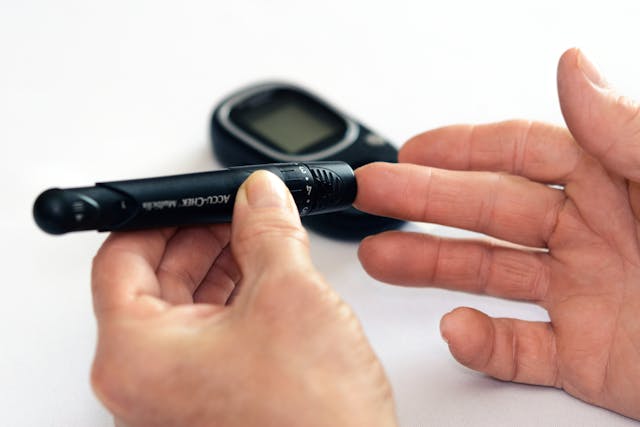
Living with Diabetes: The Sweet Life (Minus the Sugar)
Admin User
Published on: Wed 30, Jul 2025Edited on: Tue 19, Aug 20250
0
0

Diabetes. It’s a word that often comes with a heavy sigh or a concerned look, but living with diabetes doesn’t have to feel like a constant battle. Whether you’ve
just been diagnosed with Type 2, or you’ve been living with Type 1 for years, the key to
managing it is learning how to manage the condition effectively and adjust your lifestyle in
ways that work for you. In this blog post, we’ll go into the basics of living with
diabetes, offering some practical tips to make daily life easier, healthier, and more
manageable.
What exactly is Diabetes?
Type 1 vs Type 2:
- Type 1 Diabetes: In Type 1, your body doesn’t produce insulin, a hormone that
helps regulate blood sugar. This means you need to take insulin every day,
usually through injections or an insulin pump. Type 1 is often diagnosed in
childhood or early adulthood, though it can happen at any age.
- Type 2 Diabetes: This is the more common type and occurs when your body
doesn’t respond properly to insulin or doesn’t make enough of it. Type 2 is often
linked to lifestyle factors such as poor diet, inactivity, and obesity, but genetics
also play a role. Managing Type 2 can sometimes involve medication, lifestyle
changes, and, in some cases, insulin therapy.
Managing Diabetes- Practical Tips for a Healthier Life
Managing diabetes might seem overwhelming at first, but once you know what works for
your body, it becomes part of your daily routine. The trick is to focus on a few simple
habits that can make a world of difference.
1. Food Choices
a. Eat high fiber foods like whole grains, vegetables, and legumes which
keep your blood sugar stable and are packed with nutrients.
b. Instead of eating processed sugary snacks and treats, opt for whole fruits
and natural sweeteners
c. Follow the 80/20 rule! You don’t have to completely cut out your favorite
comfort foods, just make sure you eat healthy foods 80% of the time and
enjoy treats in moderation for the other 20%, balancing diabetes
management with enjoyment.
2. Move Your Body
a. Aim for at least 30 minutes most days of the week of any kind of
movement: walking, yoga, dancing, etc.
b. Switch it up! While cardio exercises help with overall blood sugar control,
strength training can also help build muscle, which improves insulin
sensitivity.
3. Know Your Numbers
a. Use a glucose meter and check blood sugar levels regularly
b. Keep a log of these values to help you spot patterns and make
adjustments to your diet, medication, or exercise.
4. Hydration is Key
a. Water is the best option to keep your body hydrated
b. Avoid sugary drinks like soda or sweetened teas, as they can cause a
spike in blood sugar.
c. A simple trick to stay hydrated throughout the day is to keep a bottle on
hand at all times (No excuses!)
5. Manage Stress
a. It is easier said than done but get enough sleep! Poor sleep can interfere
with blood sugar control, so aim for 7-9 hours of sleep each night.
b. Activities like meditation, deep breathing, and yoga can help reduce stress
and improve overall well-being.
6. Stay connected with your provider
a. Don’t skip your regular check-ups and ask questions if you don’t
understand something, your doctor is there to guide you through this
journey.
Living with diabetes doesn’t mean your life has to be all about restrictions. In fact, it can
be a path to feeling more connected to your body, making better choices, and learning
to love yourself in a whole new way. By focusing on small, positive changes such as
eating well, staying active, managing stress, and staying informed, you’re well on your
way to not just managing diabetes, but thriving with it. For more information, tips, and
tricks, check out some links I have attached at the bottom. Embrace the sweet life, just
minus the sugar.
Helpful links:
American Diabetes Association – Nutrition- https://diabetes.org/food-
nutrition/eating-healthy
CDC- Managing Diabetes- https://www.cdc.gov/diabetes/living-with/index.html
Mayo Clinic- Diabetes Diet- https://www.mayoclinic.org/diseases-
conditions/diabetes/in-depth/diabetes-diet/art-20044295
NIDDK - Stress and Diabetes- https://www.niddk.nih.gov/health-
information/professionals/diabetes-discoveries-practice/helping-patients-with-diabetes-
manage-stress